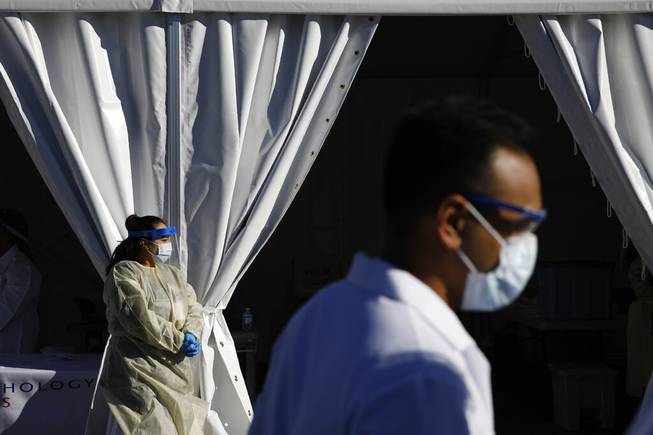
John Locher / AP
Health care workers with the UNLV School of Medicine wait in personal protective equipment for patients at a drive thru coronavirus testing site Tuesday, March 24, 2020, in Las Vegas. UNLV Medicine, the clinical arm of the UNLV School of Medicine, started conducting COVID-19 testing by appointment for people who meet the Centers for Disease Control and Prevention guidelines.
Thursday, March 26, 2020 | 2 a.m.
View more of the Sun's opinion section
While Nevadans of all walks are feeling the brunt of the coronavirus pandemic and its health and economic side effects, immigrants living here without legal permission have their own set of problems associated with the outbreak.
Their status does not give them unemployment protections, and a tense relationship with segments of the community and the federal government may make some of them wary about seeking treatment if they become infected by the virus.
To those, Bliss Requa-Trautz, director of Arriba Las Vegas Work Center, offers this advice:
“This is a public health crisis, and we are all equally at risk. Anyone feeling symptoms should be self-isolating and … feel confident going to hospitals.”
Cecia Alvarado, Nevada state director for Mi Familia Vota, said that immigrants without legal status should seek out a “trusted health care provider.”
“All of us, regardless of our immigration, we should use our best judgment to make that decision,” Alvarado said.
“The best option is to go and get the medical attention that you need,” Requa-Trautz said.
Another issue for workers without legal status, Requa-Trautz said, is the lack of unemployment programs available. Many of these workers don’t qualify for unemployment or paid sick leave, and none of the bills passed by Congress in the wake of the virus’ spread have applied toward the community.
Gov. Steve Sisolak has mandated the close of all nonessential businesses in Nevada, leaving many in Nevada, including day laborers, without a typical source of pay. Requa-Trautz said the day-laborer segment of the population may boom as people are forced from their jobs during the pandemic.
“Many have already (lost their jobs). Many people are already in this moment of crisis,” Requa-Trautz said. “The people who are calling our office nonstop today … don’t have food for this evening.”
Requa-Trautz said that Arriba was organizing transportation for people to reach food banks, and she urged anyone facing difficulties to seek assistance at a food bank.
U.S. Citizenship and Immigration Services has a “public charge” rule, in which applicants who are marked as potentially becoming dependent on federal benefits will be denied citizenship. Alvarado said that immigrants who seek treatment for COVID-19 would not suffer any impact to applications for citizenship — a stance that USCIS has stated publicly.
“To address the possibility that some aliens impacted by COVID-19 may be hesitant to seek necessary medical treatment or preventive services, USCIS will neither consider testing, treatment nor preventative care (including vaccines, if a vaccine becomes available) related to COVID-19 as part of a public charge inadmissibility determination,” the USCIS website reads.
These situations have not been dealt with by Congress, though Nevada U.S. Sen. Jacky Rosen said at a Homeland Security and Governmental Affairs Committee meeting earlier this month that those lacking legal status in the country should be able to seek health care without intimidation.
“As we work to contain the coronavirus, we have to ensure that there is timely access to medical care for everyone who needs it — regardless of their status. This is a public health and safety issue,” Rosen said. “Anything less puts all of our communities at risk.”
Additionally, Immigration and Customs Enforcement has said that it would be suspending deportation operations for immigrants lacking legal status that have not committed violent crimes, and that it will would not be conducting raids in “sensitive locations” like hospitals except under “extraordinary circumstances.”
In a statement, ICE said it would focus on “public safety risks and individuals subject to mandatory detention based on criminal grounds.” The statement said ICE would delay certain immigration enforcement until after the crisis or find alternatives to detention.
Meanwhile, the Nevada Hispanic Legislative Caucus has put together a task force to work with the community to tackle concerns that may come up during the pandemic. The caucus has transitioned its website into an information center about the coronavirus. Assemblywoman Selena Torres, D-Las Vegas, who chairs the task force, said in a statement announcing the group’s formation, that it would work to get information out on “health care, unemployment, food distribution centers and rent assistance.”
The caucus has collected information on food and small-business resources on its website. Alvarado, vice chair of the task force, said said the group’s work included looking for nonprofit resources and working with different subcommittees at the state level to find help for Latino and undocumented communities.
Alvarado said there’s a lack of trust in the federal government that could lead undocumented immigrants to not seek health care. This is combined, she said, with a sense in some communities that they do not want to seek help from federal programs.
“They just don’t like to be seen as they’re here to become a burden to the government,” she said.
